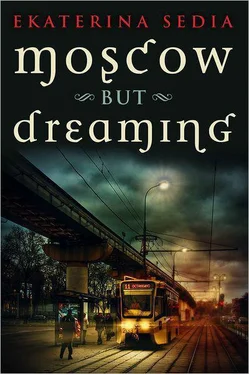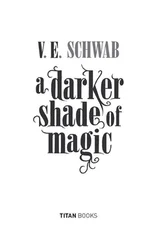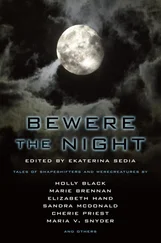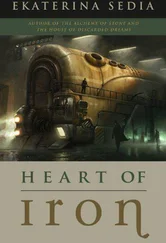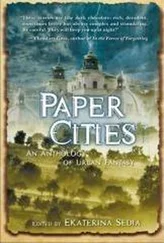“I have something else,” the cavalryman said.
“A copper,” she answered without even asking what it was, as if some force nudged her from the inside.
His gaze lingered on her face and traveled down, softening. “It becomes you,” he said, his hand motioning vaguely at her chest.
She looked down and blushed, suddenly aware of the lace shawl over the dress that neither belonged to nor fit her.
His large, square hand touched her elbow. “I’m Vasily Kropotkin,” he said.
“Like the Prince.”
“Exactly.”
“What do you have for me then?”
Metal clanged to the ground—two sabers in rusted sheaths and a horseshoe, a set of gold-embroidered epaulettes and several medals citizen Komarova did not recognize. “Surely it’s worth more than just one copper,” Vasily said.
She gave him two. Her fingers, gathered into a pinch as if for a blessing, touched his palm as if it was a holy font, and again her mind was momentarily invaded by whispers and bubbling, hissing screams. She took a step back and he disappeared again— she could never see him actually leave, it was him and then the opened door and a swirl of snow, the ringing of his spurred boots on the frozen ground, his long coat sweeping the path in the snow. And then she was alone, among the glassy staring eyes of foxes and the silently accumulating dust. As soon as the sun went down, she fled up the stair into her small, virginal apartment where the heat from the potbellied stove chased away her fears that crowded so densely and so coldly in the shop downstairs, where the dresses rustled and the imaginary whispers grew louder after the sundown.
Vasily came back in the middle of February, when the wind chased the twisting snow serpents close to the cold ground, and the icicles fringing every doorway and window frame pointed down like transparent daggers, threatening to break off and pierce at any moment. The door clanged open, and the cavalryman—gaunter and sadder but unmistakably himself— smiled at her. His lips, bloodless and thin, pulled away from his teeth, and his cheekbones became suddenly prominent, and the thousand ghost eyes—sharp as the icicles sparkling along the top edge of the doorway—looked through his, grey and cold.
Citizen Komarova felt a chill, and yet her fingers reached out, a greening copper held between them. She touched his callused palm before he had a chance to chase horrors from his eyes and he smiled again, warming, becoming human at her mere touch. The foxes in the corners reared and whispered, baring their teeth, their weak dangling paws clenching, their eyes clear amber and malice. She paid them no mind.
“What do you have for me today?”
He gave her a burlap sack, its bottom dark and crusted. She looked inside, into the pink lace of frozen frothy blood to see a horse’s leg, chopped off at the knee, its fetlock covered in long matted hair. She noticed round holes studding the circumference of the hoof and no horseshoe.
She looked away swallowing hard, fighting back a wave of nausea, a riptide of swirling blackness that edged into the field of her vision threatening to swallow it whole. His callused, working-class hand took hers, steadying her on her feet, and she blushed bright-crimson at his touch.
“I cannot give you more than one,” she said.
“It’s all right.” He smiled. “I will bring more.”
And before she could protest, before she could stop him, he was gone.
She had disturbing dreams that night—her usual memories of that one perfect summer overlapping over the more desolate and recent events, and one moment it was warm sand and smell of olive blooms, the next she felt callused working-class genitals pressed against the small of her back and she arched, sighed, and woke up, blushing, too hot to go back to sleep. And yet soon the waves pounded and the bed rocked under her, with the rhythm of the sea or something even more forgotten and unknowable, the warmth, the salt.
The shop downstairs caught the mild contagion of her dreams, the faint malaise—it behaved in the mornings, but as soon as darkened afternoons demanded that she lit the kerosene lamp on the counter, the shadows agitated the dresses, and the fox skins, shameless, wandered around the shop on their soft woolen legs. The severed horse’s leg thumped on the hardwood tiles haughtily, searching for its missing horseshoe. The lace unraveled and the dresses paired up and twirled in a dance or flailing panic, and fur coats chased away the moths with their long sleeves and then silently stalked the fox skins, who had the advantages of having body shapes rather than being flayed and stitched to others like themselves. They also had eyes, unlike almost everything else in the shop, and they did a better job avoiding Citizen Komarova and not blundering blindly into her.
By the time of Great Lent, on Clean Monday, almost everyone in N. was hungry, and the fast seemed a necessity more than an imposition. When Citizen Komarova left the shop, chased away by the disturbing goings-on, she walked down the snowpaved streets, wondering to herself at how quiet everything was, before realizing that the missing sounds were those that used to belong to livestock—there was no mooing, bleating, nor clucking; no hissing nor barking nor quacking nor meowing, for that matter. Even the human voices were few and subdued. She walked to the bakery and bought a loaf of bread, dry and raspy with mixed-in chaff. She took it to her garret and crumbled it into a bowl of water, with just a splash of precious sunflower oil, and ate it slowly, chewing each bite a hundred times, stretching it, stretching like a winter night when the sleep would not come. The skin on her neck hung looser, a long sad flap. Her waist however had grown slimmer, and now most of the dresses in the shop were too large for her, their full skirts swirling of their own volition about her feet, and sometimes swaying with enough force to make her stumble or almost knock her off her feet. She wore them all the time now, never sure when Vasily Kropotkin would show up but confident that he would. She did not bother to explain to herself why his arrival was important, and why it mattered if he complimented her flowing skirts and delicate crocheted flowers winding about her throat, so beautiful.
He arrived late at night. The kerosene lamp was blown out and Citizen Komarova lay sleepless in her narrow bed in her narrow garret, one side of the roof above her slanting at a sharp angle, memories of past snowfalls whispering in the rafters.
She heard the heavy footsteps in the shop downstairs and lay on her back, listening intently, trying not to breathe so as not to miss the slightest sound—neither the jingling of spurs nor the creaking of the steps, nor the thump of a new burlap sack. It fell to the floor heavily and wetly, with a sucking thwack that made her skin crawl. She knew that she would never dare to look inside, but that the disembodied horse leg would probably investigate and lean against the sack forlornly, its furry fetlock matting with the slow seeping of thick black blood.
Of course he would want his payment—the steps creaked, closer and closer, and the chills and the whispers followed, reluctant to let him go.
The door creaked. Citizen Komarova licked her lips, and said in a small, croaking voice, squashed with terror and sadness, “I have no coppers to give you.”
“It’s too bad,” he said. The bed creaked and shifted as he sat on its edge, invisible in the darkness but solid.
“There are some downstairs, in the shop,” she said. “Come back in the morning.”
His wide, warm palm touched her face gently but with a hidden threat of superior strength and class position. “Can I stay here?”
She nodded wordlessly, her lips and eyelashes brushing against the leathery contours of his open hand.
Читать дальше
